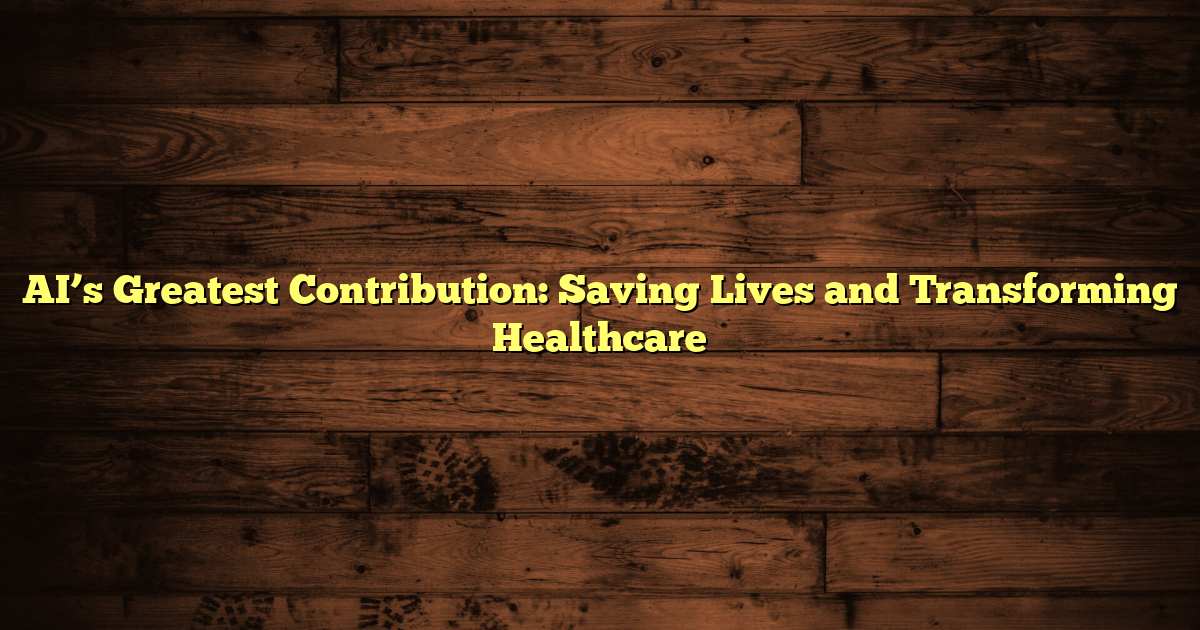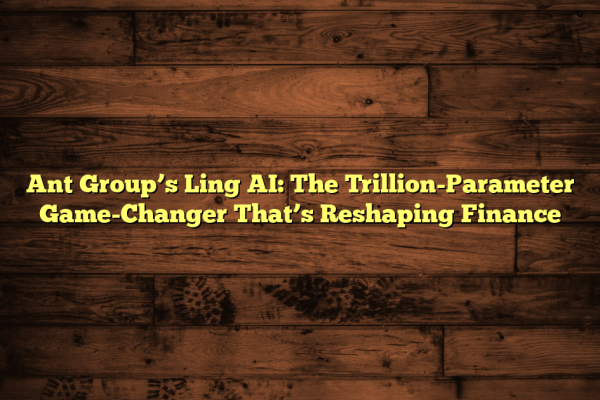AI’s Greatest Contribution: Saving Lives and Transforming Healthcare
Table of Contents:
- Introduction
- A Brief History of AI
- AI in Healthcare: A Game Changer
- Revolutionizing Medical Diagnostics
- Accelerating Drug Discovery
- The Rise of Personalized Medicine
- The Everyday Impact of AI
- Why Focus on Healthcare?
- AI’s Role in Public Health
- Other Achievements Worth Mentioning
- Triumph in Chess and Go
- Advances in Robotics and Human Interaction
- Conclusion: A Healthier Future
- FAQ
AI’s Greatest Contribution: Saving Lives and Transforming Healthcare
Is artificial intelligence just a buzzword, or a game-changing technology? It is true that a lot of hype surrounds it, however, AI is already making remarkable changes to our everyday lives. Its impact on healthcare specifically, stands out as a beacon of hope.
A Brief History of AI
Alan Turing wondered if machines possessed thinking capabilities, back in the 1950s. Simple chatbots, like ELIZA, as well as robots capable of navigating independently around rooms followed. The real transformation happened when AI stepped out of the labs, making itself felt in homes as well as workplaces.
AI in Healthcare: A Game Changer
Today, AI powers smartphone assistants (thank you, Siri!), filters spam from your inbox, next to suggests what to watch on Netflix. AI also steers particular cars. It is in healthcare that AI really shines, becoming a powerful instrument for good.
Revolutionizing Medical Diagnostics
One such field is medical diagnostics. Sophisticated deep learning models evaluate medical images. X-rays or MRIs, for instance, can be analyzed with an accuracy that rivals, in some cases surpasses, the expertise of skilled doctors.
- Earlier detection of diseases is made possible.
- Reliability in identifying conditions is increased.
These systems have been trained on millions of images. This is something that one single doctor couldn’t match.
Accelerating Drug Discovery
Another area in which AI shines is drug discovery. Traditionally, developing a novel medicine demands a lot of time. Often decades are spent at a cost of billions of dollars.
- Machine learning algorithms sift through data on chemical compounds.
- Researchers are better able to identify promising drug candidates.
During the COVID-19 pandemic, it helped scientists scan the mountains of data on potential treatments faster.
The Rise of Personalized Medicine
AI also makes personalized medicine possible. Genetic data, along with patient histories, are analyzed. This leads to recommending custom-tailored treatments. Instead of guessing, doctors can now utilize data-driven insight to help them in their decisions.
The Everyday Impact of AI
AI saves lives and improves lives, that’s how AI has had a great impact. Now, let’s delve into other daily benefits we have unknowingly been reaping.
- Voice Assistants – Siri was a game-changer, wasn’t it? Now millions benefit from hands-free schedule management.
- Language Translation – Neural networks power Google Translate. Now cross-language communication is almost immediate.
- Recommendation Systems – Whether it’s online shopping or streaming, learning machine content keeps users hooked. It also supports business growth.
Everyday tasks are easier now. Smart algorithms predict what you need based on habits as well as preferences.
Why Focus on Healthcare?
Entertainment suggestions or voice commands make life easier. However, healthcare applications truly change people’s lives. Medical applications directly save lives. They also reduce suffering. It results in higher-quality living for a large population. This is not just for individual convenience.
AI’s Role in Public Health
Picture a doctor receiving results of a CT scan. A spot is detected. Is it a benign or malignant tumor? A deep learning model comes in. Trained with a multitude of similar scans, it provides a second opinion. A confirmed diagnosis appears in seconds, as do treatment plans, reducing anxiety for the patient.
Efficiency and accuracy like this weren’t possible before AI became mainstream.
And then consider how public health is monitored. Pandemics, crises, or natural disasters demand rapid analysis of large data sets. This helps in containing the spread of disease or effectively allocating resources.
Again, it is impossible without advanced computational methods. Intelligent systems, running in the background, work diligently. Few see or appreciate the load lifted, except those depending on them.
Other Achievements Worth Mentioning
Of course, other fields are benefiting from AI advancements.
Triumph in Chess and Go
- Game-Changing Wins – IBM’s Deep Blue defeated Garry Kasparov in chess back in 1997. It demonstrated that computers outthink grandmasters.
- Go Mastery – Google DeepMind’s AlphaGo prevailed against Lee Sedol, a top player in the complex Chinese game Go. This demonstrated computational limits continue to expand.
Advances in Robotics and Human Interaction
Robots such as Sophia show how far robotics have advanced. Sophisticated speech ability, facial recognition, as well as emotional expression, play a big part in their interaction with people.
These feats don’t match the scope and societal impact observed in medicine, science, along with related applications.
Conclusion: A Healthier Future
So, when asked, “What is the most useful thing AI has ever done?”, the response mirrors the person answering. However, evidence from independent sources suggests a clear agreement. The greatest value stems from solving complex problems related to human health, prosperity, as well as a sustainable planet.
In short? AI saves lives, improves results, reduces suffering, empowers professionals, next to makes the lives of people easier and healthier.
FAQ
What is artificial intelligence?
AI is a branch of computer science focused on creating machines that simulate human intelligence. It includes learning, problem-solving, along with decision-making.
How does AI help in medical diagnostics?
AI can analyze medical images like X-rays or MRIs with high accuracy. AI helps doctors detect diseases earlier and more reliably.
Is AI going to replace doctors?
No, AI is intended to assist, not replace, doctors. AI enhances the decisions doctors make with data-driven insights.
How can I learn more about AI?
Many online courses are available through platforms like Coursera, as well as educational resources. You can find lots of information through independent tech journalism and knowledge bases.
Resources & References:
- https://www.techtarget.com/searchenterpriseai/tip/The-history-of-artificial-intelligence-Complete-AI-timeline
- https://en.wikipedia.org/wiki/Timeline_of_artificial_intelligence
- https://www.grammarly.com/blog/ai/ai-history/
- https://www.coursera.org/articles/history-of-ai
- https://www.leanix.net/en/wiki/ai-governance/history-of-ai





